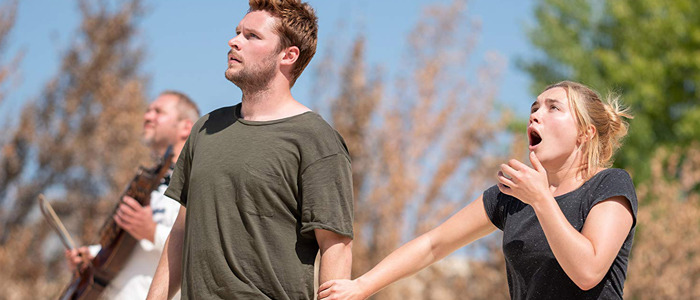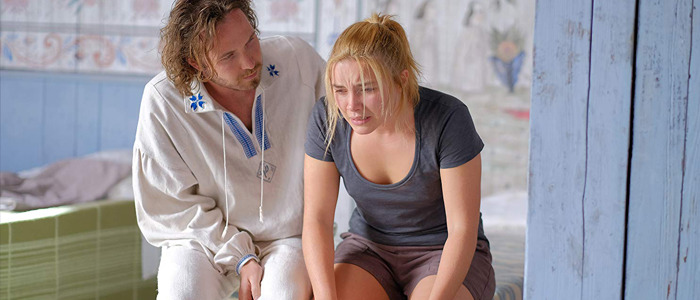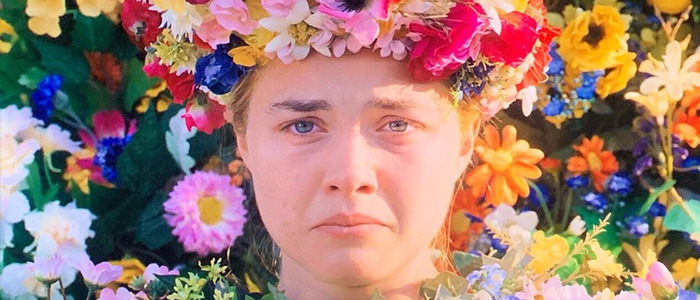'Midsommar': Ari Aster And Florence Pugh's Complex, Climactic Catharsis
(Welcome to The Soapbox, the space where we get loud, feisty, political, and opinionated about anything and everything. In this edition: Midsommar is one of the most cathartic movies ever made.)Cinema has always had a way of making the real world make more sense to me. Throughout the years, I've identified with the heroines of rape-revenge cinema and the women of Tarantino films. When reality prevents me from getting closure, I can sometimes find it in film. However, I didn't expect to find catharsis in Ari Aster's Midsommar, especially given how traumatic Hereditary was. I expected to leave the theater feeling disgusted and raw, but I left elated. By experiencing my own trauma again through the beautiful and twisted lens of Dani's story, my years-old wounds were scrubbed clean. I left feeling as if I had just been through two and a half hours of intense therapy. Midsommar is a challenging film. It's heavy – full of grief, death, pain, and genuine horror. There are moments of levity scattered throughout as the movie riffs on its own absurdity, but it isn't an easy experience. Aster has said in interviews that the movie is protagonist Dani's fairy tale, and in a way, it felt like my fairy tale. I identified with Dani (Florence Pugh) in several ways, and our shared name didn't hurt. Like Dani, I have an anxiety disorder. I have a terrible fear of abandonment. At the age of twenty, I moved thousands of miles away from anyone I knew besides my then-boyfriend, whose behavior mirrored her boyfriend Christian's enough to be eerie. It wasn't Sweden, but it wasn't home either. While our experiences obviously weren't identical, the interactions between Dani and the people around her mirrored my own. Her trauma legitimized my own. (Spoilers ahead.)
Together, But Alone – Christian and Dani
Isolation is a hell of a thing. It forces us to be stronger than we knew we could, without whatever support system we previously had. At the beginning of Midsommar, Dani is already isolated, with few friends and a family she can't reach. Her primary support system is Christian (Jack Reynor), who doesn't have the energy or emotional capacity to care for her. When she calls him, distraught because of a disturbing email from her sister, he tells her she's overreacting. He convinces her that she's making a big deal out of nothing, just like her sister does. He minimizes her feelings and invalidates her mental illness, and in the end Dani unnecessarily apologizes. Show me a woman and I'll show you someone who has been told they were overreacting or hysterical. We're expected to behave a certain way, and if that way is outside of the social norms then we're labelled as "crazy" or "difficult." Hysteria, an "psychological affliction" believed to only affect women, was only removed from the official Diagnostic and Statistical Manual of Mental Disorders in 1980. As a result, women are often gaslit by their partners so the partner can maintain a semblance of control. Christian makes Dani feel like she's guilty for needing his help, so he doesn't have to feel guilty for not being able to provide it. Guilt and shame are the two driving forces behind Dani and Christian's behavior. They both feel shame that their relationship is what it is. Christian is ashamed that he can't be enough for Dani, and he is ashamed of how her behavior makes him look to others. After her sister kills herself and murders both of their parents, Christian is bound to Dani by shame. He can't leave her now without looking like the world's worst boyfriend, but he's no longer happy with her, either. To combat his shame, he projects it upon Dani through gaslighting and manipulation. He invites her to come with his friends to Sweden, though he's convinced she won't take him up on the offer. He even forces his friends to pretend it was their idea to invite her. Christian will use social contracts and the fear of being ostracized to convince Dani (and his friends) to do whatever he wants them to do. This becomes most apparent when they reach their first destination in Sweden and are offered psychedelic mushrooms. Dani is hesitant to take them because of the strange location and her emotional state, but Christian and his friends bully her into joining them. Christian tells her she doesn't have to do it and that he'll wait with her, though he clearly isn't happy with the arrangement. Ashamed and feeling ostracized, Dani takes the mushrooms and has a gnarly mental and physical trip that ends with her sleeping alone in the woods. She is ashamed of her grief and panic and doesn't want anyone to see it. Throughout the film, whenever she feels overwhelmed, she immediately separates herself from the group. By being completely isolated in her suffering, she's unable to heal in any meaningful way. There is no one to help her share the burden of her loss.
Kindness Comes at a Cost – Pelle
It's important to note that Dani is mostly surrounded by men in the early parts of the film. All of Christian's friends are men, so Dani doesn't quite fit in with them. Only Pelle, who is from Hårga and invited them all to come see the festival, seems to care about Dani in a meaningful way. But Pelle's intentions are not entirely altruistic. Several times throughout the film, Pelle questions Dani about her relationship with Christian. He asks her if she feels held, and she clearly does not. He tells her that he is glad most of all that she came to Hårga, because they have something there that she needs. His attentions are refreshingly empathetic, but there seems to be a sinister tinge beneath them. Though Pelle does want what's best for Dani, he also seems to be in love with her himself. His character can trace its origins to the dejected best male friend trope, or, in more modern terms, the "friend-zoned one." Pelle barely hides his distaste for how Christian treats Dani, and he even suggests to her that she deserves better. Pelle reminded me of all the men in my life who had been infatuated with the idea of me when I was with someone else. Beginning in my teenage years, there was always one male friend or another who clung to me in my hardest times, only to turn around and try to get in my pants the moment my guard was down. While Pelle doesn't try anything sexual with Dani, he does manipulate her into giving him what he wants by ending her relationship with Christian. After the events of the film are over, it's easy to imagine Pelle trying to engage in a romantic relationship with Dani. She is his May Queen, his perfect object of desire. While Pelle's desires for Dani are more beneficial than Christian's, he still doesn't see her as a whole person. He imprints his own desires for their future upon her, even if that's not what she might want without such heavy influence.
Scream With Me – The Women of Hårga
One of the first things I noticed about Hårga was that a woman seemed to be in charge. She follows the writings of their sacred, physically deformed prophet Ruben (Levente Puczkó-Smith), but Siv (Gunnel Fred) is clearly in charge. She wears a special red hairpiece that signifies her power over the rest of the clan. Red is the color of lust, blood, and power for the women in Hårga. After the virginal Maja (Isabelle Grill) seduces Christian through magic and/or psychedelic drugs and persuasion, we see her wearing a bodice embroidered through with red. Her lips are crimson, and she clearly has a new, more esteemed place among the women. The women of Hårga are to just as much blame for the murders of the grad students and manipulation of Dani as the men, but their methods feel more based in genuine empathy. They invite her to take part in women's activities, baking meat pies together for lunch. It's the first time we see Dani look truly relaxed and comfortable. There are no expectations of her beyond simple ones, and there is no reason for shame. She is just one of the women in a group, able to lose her broken identity for a moment to assimilate. Kitchens have long been the place where women share themselves with each other. One of my fondest memories during my own traumatic isolation was being invited to help make breakfast. We were living with a big family from a very different culture at the time, and I immediately jumped to the tasks I knew how to do. As I chopped onions and learned how to properly cook chorizo, the mother of the house and I chatted about anything and everything. I didn't have to behave any certain way, and it was easy to fall into the domestic routines I had known since childhood. In that kitchen, I felt held. Better yet, the onions excused my tears. The women in Hårga share everything. When Maja and Christian have ritualistic sex, many of the elder women surround them, mimicking Maja's pleasure and pain. They encourage Christian, with one of the oldest women even physically helping him in the act. There is no shame about sexuality or women's pleasure, and the women themselves are the ones who choose lovers. Compared to the patriarchy of most of the rest of the world, this distinction seems important. This is a place where Dani might not have full control, but her autonomy has nothing to do with her gender/sex for the first time. After Dani discovers Christian having sex with Maja, she becomes violently distraught. She attempts to escape to solitude, as always, but the women of Hårga follow her. They begin screaming and crying with her. The women encircle her, making sure that she is literally held as she wails and grieves. While it's possible to see this as additional manipulation, it felt to me like a ritual as old as time. Who hasn't called their friends after a bad breakup for a pity party? Just as the women of the Hårga share the experience of sexual pleasure, they share Dani's pain as well. They help her bear the load and remove her from her isolation.
The Catharsis of Dani’s Smile
While it can absolutely be argued that Dani exchanges one cage for another, there is something deeply cathartic about the final moments of Midsommar. Dani is asked to pick the final sacrifice and she chooses Christian, though not without some internal struggle. She watches him burn and sobs while the rest of Hårga go into the throes of mass hysteria around her. The camera focuses on her face as she cries, but in the final second, a hint of a smile curves her lips. That smile made me bark out a laugh that startled the poor woman sitting beside me in the theater. That smile symbolized finding joy again after so much pain. Even if that joy was brought about by something awful, it feels like a new beginning for Dani. She's free from her bad relationship, free from her guilt, and free from her isolation. While Hårga may not be an ethical place, it is the right place for Dani to finally find peace. Many survivors of trauma have a difficult time integrating into the regular world. Post-Traumatic Stress Disorder can make social contracts especially challenging. Often, these survivors seek out unusual communities of their own, places where they don't have to feel shame for their traumatic pasts or their current struggles. There are entire subcultures full of trauma survivors who came together for one reason or another, and many of these subcultures are viewed as deviant by the mainstream.Hårga is just an extreme example of these. Everything in Midsommar is taken to its most extreme, but there are real-life correlations that made me feel seen. They helped me process my own traumas and understand some of my life since, including some of the toxic friendships I've sought out to fix my shame. While I obviously don't condone ritual murder or using psychedelics to manipulate people without their express consent, I found catharsis in Midsommar's brutal ending. Where my other cathartic films starred badass action heroines, Dani was just a normal girl. I saw myself in her completely.As the credits rolled, I felt like the May Queen, no longer a whimpering victim. Dani's journey left me raw, but also somehow healed. My own shame has been replaced with a flower crown – one I'm proud to bear.




